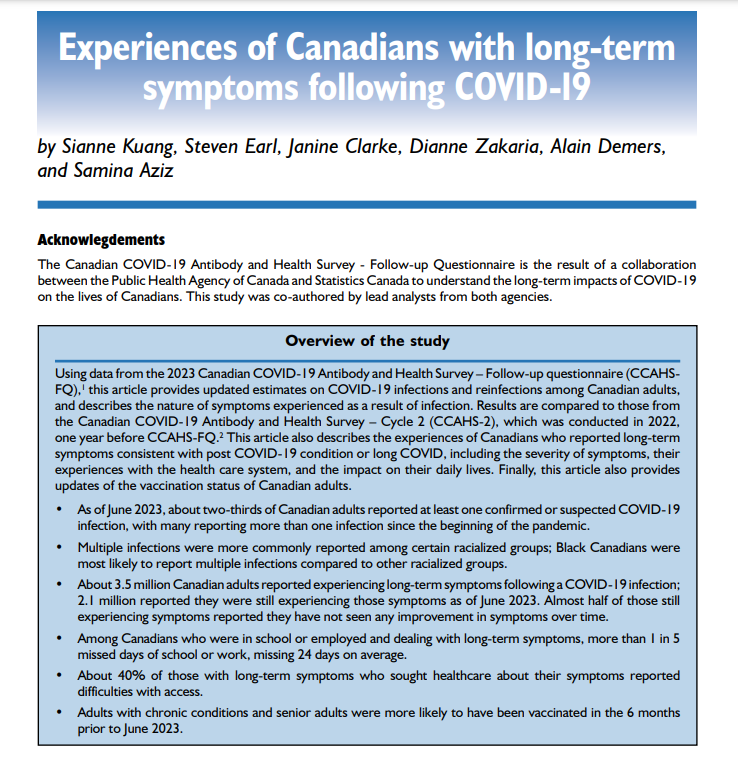COVID-19: Longer-term symptoms among Canadian adults: Third report: Fall 2023
Some people continue to experience symptoms after the acute phase of COVID-19 has ended. These longer-term symptoms are known as post COVID-19 condition, or long COVID.
- Last updated: 2024-08-21
- Download page in PDF format
COVID-19 has had a substantial impact in Canada. In addition to symptoms experienced during the acute phase of infection, some people continue to experience persistent, recurring or new symptoms. When these longer-term, wide-ranging symptoms are not resolved within 3 months, they’re commonly known as “post COVID-19 condition” or “long COVID.” They can negatively impact daily activities, work and school.
Some of the more commonly reported symptoms include fatigue, coughing, shortness of breath, brain fog, and general weakness. Because so many people have been infected, the potential burden of longer-term symptoms on patients, families, the healthcare system and the economy could be substantial.
The Canadian COVID-19 Antibody and Health Survey – Cycle 2 (CCAHS-2) was launched during the pandemic. It was a key surveillance initiative of the Public Health Agency of Canada (PHAC) and was developed in collaboration with Statistics Canada and the COVID-19 Immunity Task Force. It was designed to estimate the prevalence of post COVID-19 condition and provide information on symptoms (including severity and duration), risk and protective factors, and impacts on daily activities. 32,527 randomly selected adults from Canada’s 10 provinces responded to the survey between April and August 2022.
PHAC partnered with Statistics Canada on a follow-up questionnaire, CCAHS-FQ, to obtain updated information on adults who had participated in CCAHS-2. There were 25,544 adults who had provided valid email addresses when responding to CCAHS-2, and they were invited to participate in CCAHS-FQ. About 41.1% completed the survey between May 23 and June 19, 2023.
PHAC and Statistics Canada have jointly released an article using data from CCAHS-FQ to update the COVID-19 landscape as of June 2023, more than 3 years after the pandemic started.
The article includes self-reported information on:
- COVID-19 infections and re-infections
- prevalence, severity, and duration of longer-term symptoms
- impact of longer-term symptoms on daily activities, work, and school
- experiences of people seeking healthcare services for longer-term symptoms
- use of prescription medications specifically developed to treat COVID-19
- vaccination history
For more information, please refer to the full article: Experiences of Canadians with long-term symptoms following COVID-19.
You might also be interested in
COVID-19 epidemiology update
Detailed data about the spread of virus over time.
COVID-19 vaccination
Number of COVID-19 vaccine doses that have been administered in Canada.
- Date modified:


